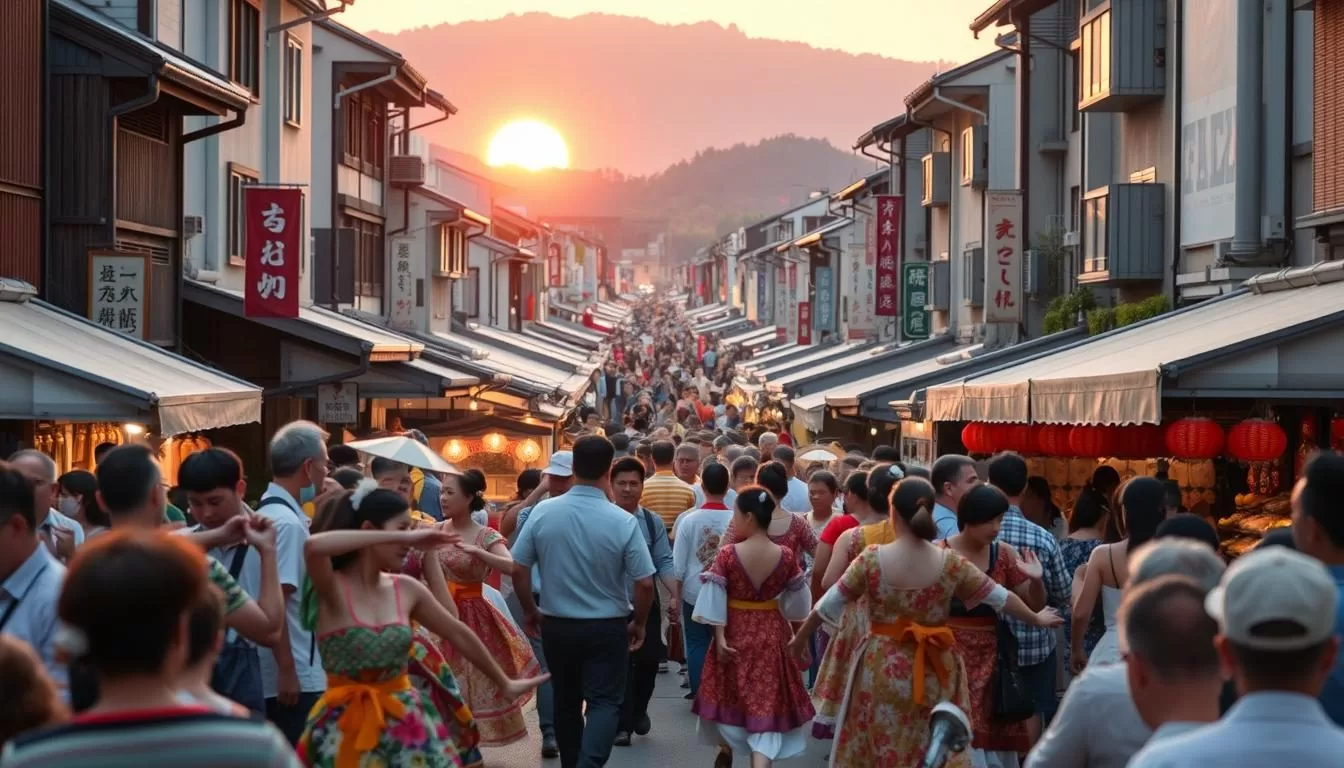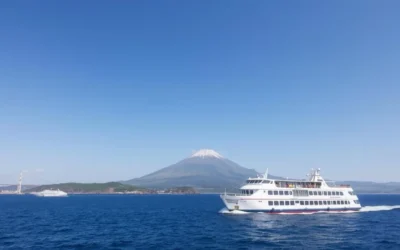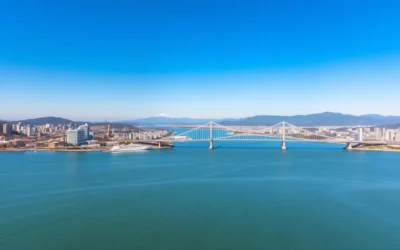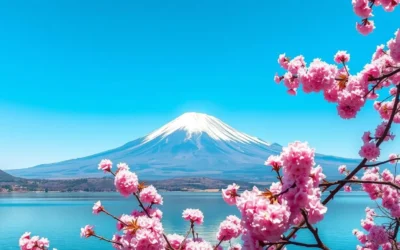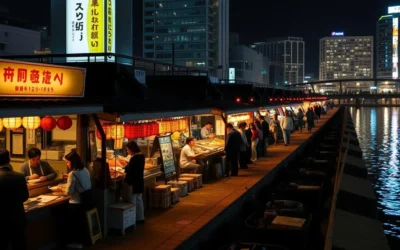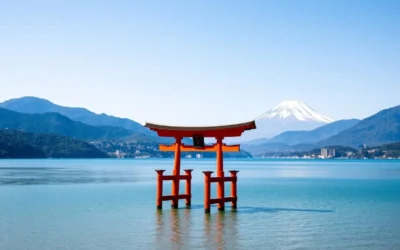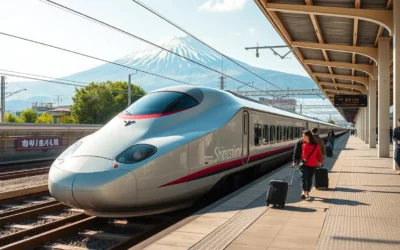✓ Accommodations✓ Flights✓ Rental Cars
Nestled in the heart of Shikoku Island, Ehime Prefecture is a treasure trove of traditional Japanese culture, breathtaking natural beauty, and rich heritage. As you plan your visit, you’ll find that the region comes alive with spectacular festivals throughout the year.
These events celebrate everything from historical legends to harvests and seasonal changes, offering a unique glimpse into the spirit of the region. By experiencing these festivals, you’ll connect with local communities and create unforgettable memories.
From strength competitions with massive floats to spectacular fireworks displays, Ehime’s festivals provide an authentic cultural experience that will leave you with a deeper understanding of Japanese traditions.
The Cultural Significance of Festivals in Ehime Prefecture
Ehime Prefecture’s festivals are a vibrant reflection of Japan’s rich cultural heritage. These events are not just entertaining spectacles but also serve as a connection to the region’s history and traditions. By participating in or observing these festivals, you can gain a deeper understanding of the cultural fabric that binds the community together.
How Festivals Connect to Japanese Traditions
Festivals in Ehime Prefecture are deeply intertwined with Japanese traditions, often celebrating the changing of the seasons, agricultural cycles, and historical events. They provide a unique window into the country’s cultural past, showcasing rituals, music, and dances that have been passed down through generations. For instance, many festivals feature traditional performances and costumes that reflect the region’s history and cultural identity.
The Role of Seasonal Celebrations in Ehime
Seasonal celebrations play a crucial role in Ehime’s cultural calendar, with festivals timed to coincide with significant seasonal transitions. These events not only highlight the region’s connection to nature but also provide opportunities for communities to come together, strengthening social bonds and preserving cultural heritage. The table below illustrates some of the key festivals and their corresponding seasons.
| Festival | Season | Significance |
|---|---|---|
| Niihama Taiko Festival | Autumn | Celebrates strength and tradition |
| Saijo Festival | Autumn | Harvest celebration |
| Warei Taisai Uwajima Ushi-Oni Festival | Summer | Legendary parade and fireworks |
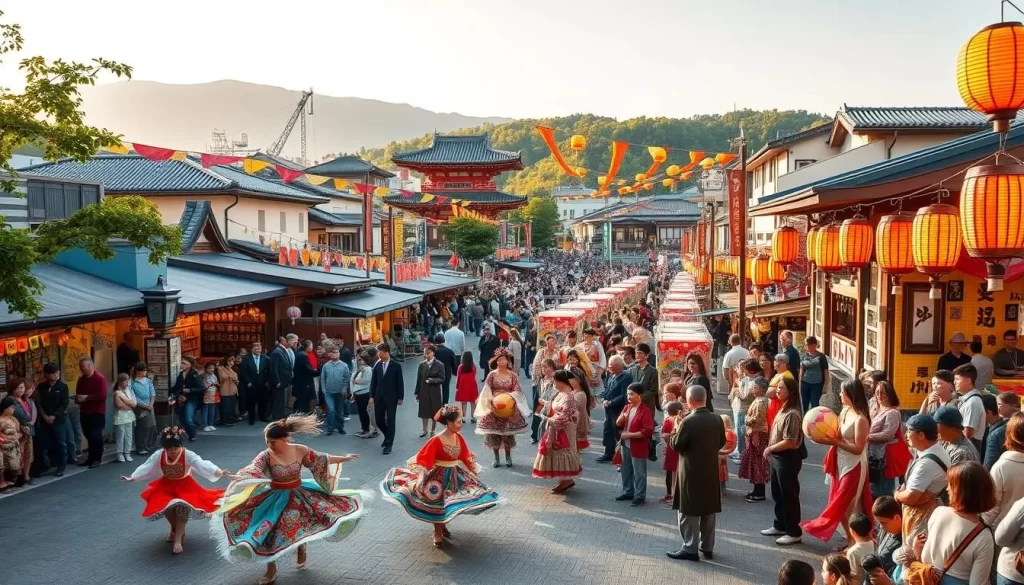
When to Visit Ehime Prefecture for Festival Experiences
With its distinct four seasons, Ehime Prefecture hosts a wide range of festivals that showcase its rich cultural heritage. You can experience the prefecture’s vibrant culture throughout the year, with each season bringing its own unique celebrations.
Seasonal Festival Calendar
The festival calendar in Ehime is diverse, with summer being particularly festival-rich. You can enjoy the vibrant Warei Taisai Uwajima Ushi-Oni Festival in July and the month-long Dogo Onsen Summer Festival in August. In the fall, the Niihama Taiko Festival and Saijo Festival in October are major events that take place every year, drawing large crowds.
Planning Your Trip Around Major Events
To make the most of your trip to Ehime, consider timing your visit to coincide with these major festivals. The area’s festival calendar provides perfect opportunities to structure your travel itinerary. Many events are concentrated in city centers, making them easily accessible. Some festivals follow the lunar calendar, so it’s essential to check the exact times when planning your trip to ensure you don’t miss out on the celebrations.
Niihama Taiko Festival: A Display of Strength and Tradition
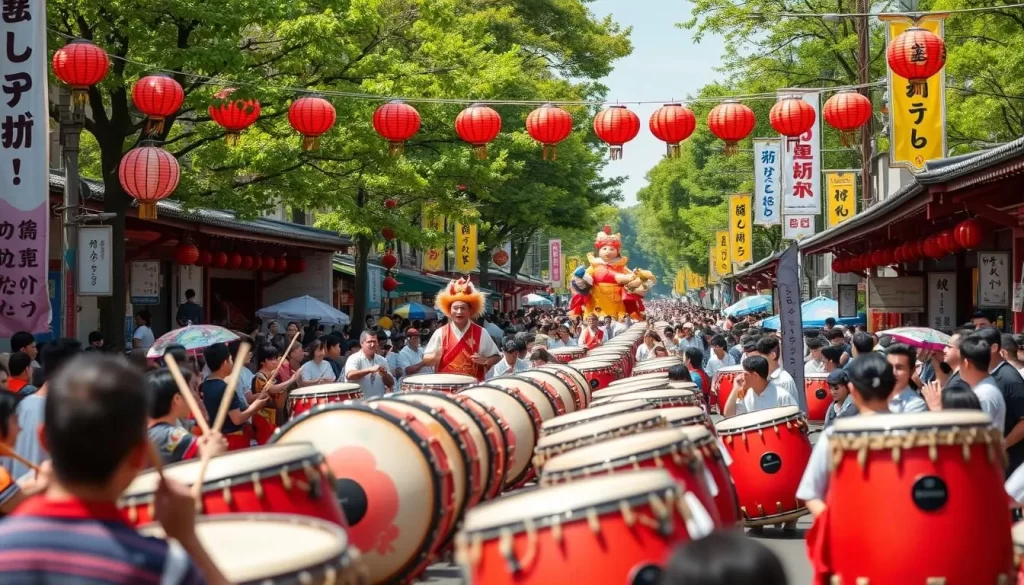
For three days in October, Niihama city comes alive with the Niihama Taiko Festival, a celebration that showcases the city’s rich cultural heritage and community spirit. This autumn festival is a significant event in Ehime Prefecture, attracting visitors from around the world.
History and Cultural Significance
The Niihama Taiko Festival has a long history, dating back hundreds of years. It originated as a harvest celebration and has evolved into a grand festival featuring 54 massive taiko-dai floats. The festival is a testament to the city’s history and cultural traditions.
The Impressive Taiko-dai Floats
The taiko-dai floats are a highlight of the festival, weighing up to three tons and adorned with elaborate gold embroidery and traditional taiko drums. At night, these floats are lit up, creating a breathtaking display that draws large crowds.
Kakikurabe: The Strength Competition
The festival’s peak event is the “Kakikurabe” strength competition, where teams of 200 men come together to lift the massive taiko-dai floats. This display of strength and teamwork is a thrilling experience for spectators and a testament to the community’s unity and spirit.
As you experience the Niihama Taiko Festival, you’ll be surrounded by the city’s vibrant atmosphere, with local artisans selling handmade embroidered art and traditional food available throughout the festival grounds.
Saijo Festival: Celebrating a Prosperous Harvest
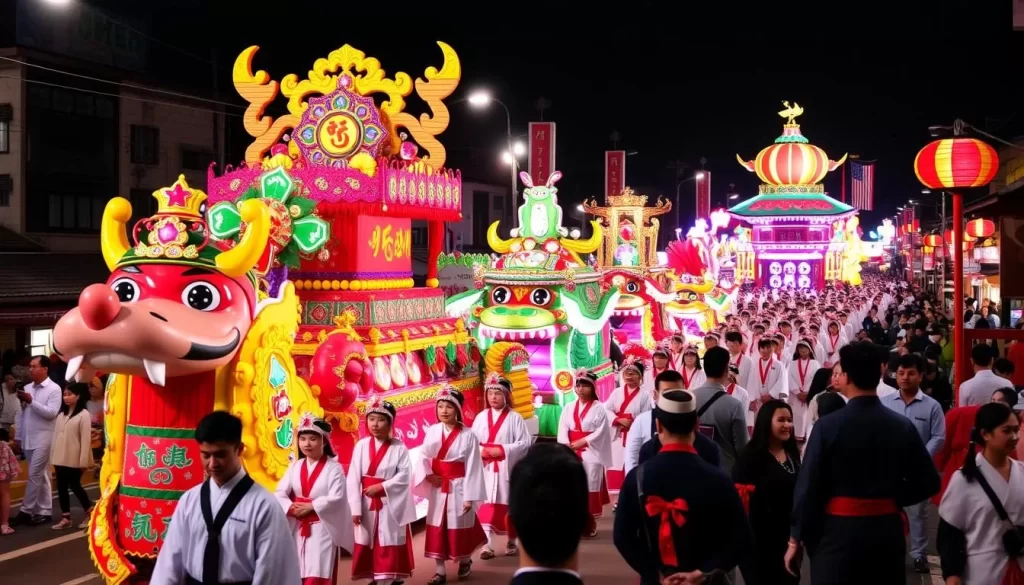
With a history spanning over 300 years, the Saijo Festival is a testament to Ehime’s rich cultural heritage. This three-day celebration takes place every year in mid-October, typically between the 12th and 17th, in Saijo City.
The festival is a vibrant showcase of community pride and agricultural heritage, featuring an impressive procession of 150 Danjiri wooden floats adorned with lanterns. These floats, along with mikoshi portable shrines and taiko-dai drum wagons, create a spectacular display that moves through the streets of Saijo City.
300 Years of Harvest Celebrations
The Saijo Festival stands as one of Ehime’s oldest cultural traditions, centered around harvest thanksgiving. For over 300 years, the people of Saijo City have come together to celebrate a successful harvest and give thanks to the gods.
Danjiri Floats and Mikoshi Processions
The festival features a stunning array of Danjiri floats, mikoshi portable shrines, and taiko-dai drum wagons. These are carried and pushed through the streets during the celebration, creating a lively atmosphere. Ceremonies and festivities take place at four important shrines: Isono, Kamo, Ishioka, and Iizumi.
Warei Taisai Uwajima Ushi-Oni Festival: Parades and Fireworks

Uwajima, a small city in Ehime, transforms into a vibrant festival hub during the Warei Taisai Uwajima Ushi-Oni Festival, held from July 22nd to 24th. This summer festival is a culmination of two annual celebrations: the Warei Taisai and Ushi-Oni Festival, attracting visitors from across Ehime Prefecture and beyond.
The Uwajima Gaiya Carnival
The festival kicks off with the all-day Uwajima Gaiya Carnival, featuring food stalls, souvenir shopping, and energetic dance performances that showcase local traditions. Visitors can enjoy the carnival near Uwajima Kisaiya Road for the best views.
The Spectacular Fireworks Display
The second day centers around music and movement, starting with a musical parade through the city and building to traditional Uwajima Ondo folk dances. The evening culminates in a spectacular fireworks display over Uwajima Bay, creating a magical night atmosphere.
The Legendary Ushi-Oni Parade
The festival reaches its climax on the third day with the legendary Ushi-Oni Parade, featuring a massive bull-demon float that’s believed to purify onlookers and ward off evil spirits as it’s paraded through the streets. The theatrical manipulation of the ushi-oni’s head creates a mesmerizing display that has both cultural and spiritual significance.
Matsuyama Fall Festival: Thrilling Shrine Battles

Matsuyama’s Fall Festival is renowned for its intense mikoshi fights, also known as hachiawase. Taking place from October 5th to 7th, this event transforms the city’s landscape into a battleground of tradition and strength.
The Famous Mikoshi Fights
During the festival, teams of men engage in ritualized battles using portable shrines. These mikoshi fights occur at various locations, including Isaniwa Shrine and in front of Dogo Onsen Station, drawing large crowds eager to witness the spectacle.
Isaniwa Shrine’s 135 Stone Steps Challenge
One of the most impressive feats during the festival is at Isaniwa Shrine, where participants carry massive portable shrines up and down 135 steep stone steps. This display of teamwork and physical prowess is a highlight of the festival, showcasing the deep-rooted history and spiritual traditions preserved for generations.
Dogo Onsen Summer Festival: A Month of Celebrations
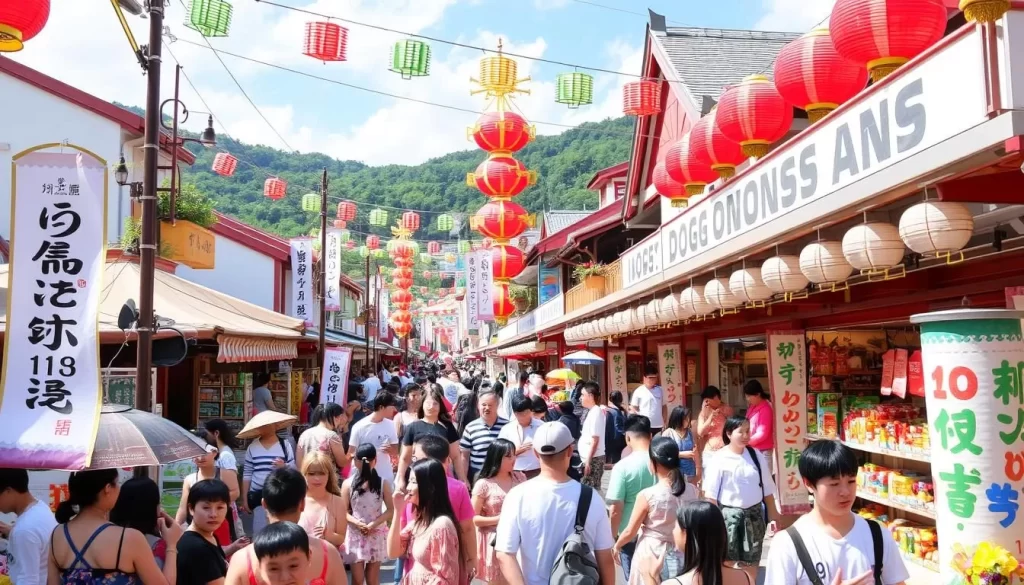
As summer arrives in Ehime Prefecture, the Dogo Onsen area comes alive with a month-long celebration. The Dogo Onsen Summer Festival takes place every year in August, offering a unique experience for visitors.
The festival begins on August 1st with Yugama Yakushisai, a ceremony where participants pray for prosperity and good fortune in the coming year.
Yugama Yakushisai: Prayers for Prosperity
Yugama Yakushisai is a significant event that marks the beginning of the festival. It’s a special ceremony where locals and visitors gather to pray for prosperity, health, and happiness.
Music, Dance, and Art Throughout August
Throughout the month, the festival transforms the historic Dogo Onsen area into a cultural hub. You can enjoy live music performances, including traditional taiko drumming that echoes through the summer evenings. Dance performances are also a central part of the festival, with both traditional and contemporary dances taking place in various locations around the onsen district.
The festival also features art exhibitions showcasing local talent, adding a visual dimension to the celebration. The month-long format allows tourists and locals to mingle naturally, creating a more authentic cultural exchange.
Doyo Yoichi Summer Festival: Saturday Night Markets
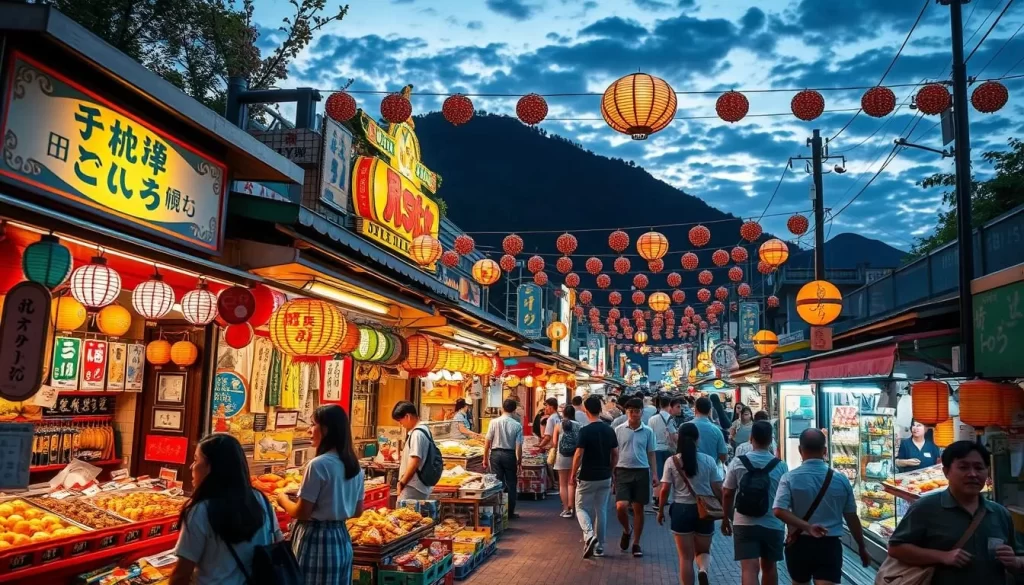
Experience the vibrant Doyo Yoichi Summer Festival in Matsuyama, Japan, a unique Saturday night market event. Every summer Saturday from late June to early August, the city’s shopping districts are transformed into bustling night markets.
Shopping and Entertainment
The Okaido and Gintengai shopping arcades become centers of activity, with vendors selling handcrafted souvenirs and local products. You can enjoy live music performances and traditional dance demonstrations, adding to the festive atmosphere.
Traditional Food and Cultural Experiences
The festival offers a culinary adventure with a variety of traditional Japanese dishes and international cuisine. You can also participate in cultural experiences and enjoy activities designed for children, making it a perfect event for families.
Ehime Prefecture, Japan: Top Festivals to Check Out When Visiting
Ehime Prefecture stands out as a festival-rich region in Japan, offering a diverse range of celebrations throughout the year. The prefecture’s festivals are a testament to its rich cultural heritage and the strong community spirit of its people.
What Makes Ehime’s Festivals Unique
Ehime’s festivals are unique due to their diversity and authenticity. From strength competitions and shrine battles to month-long summer celebrations, the prefecture offers a wide range of festival experiences. The distinctive cultural heritage of Ehime is preserved through these festivals, many of which have histories spanning hundreds of years.
- The Niihama Taiko Festival showcases strength and tradition.
- The Saijo Festival celebrates the autumn harvest with beautiful mikoshi processions.
- The Warei Taisai Uwajima Ushi-Oni Festival features fierce bull-headed floats and spectacular fireworks.
The Best Time of Year for Festival Hopping
The best times to visit Ehime for festival hopping are during the summer (June-August) and fall (October). These periods offer a concentration of festivals, allowing visitors to experience multiple celebrations in a short span. Each festival reflects the unique character of its location, providing a rich and varied cultural experience.
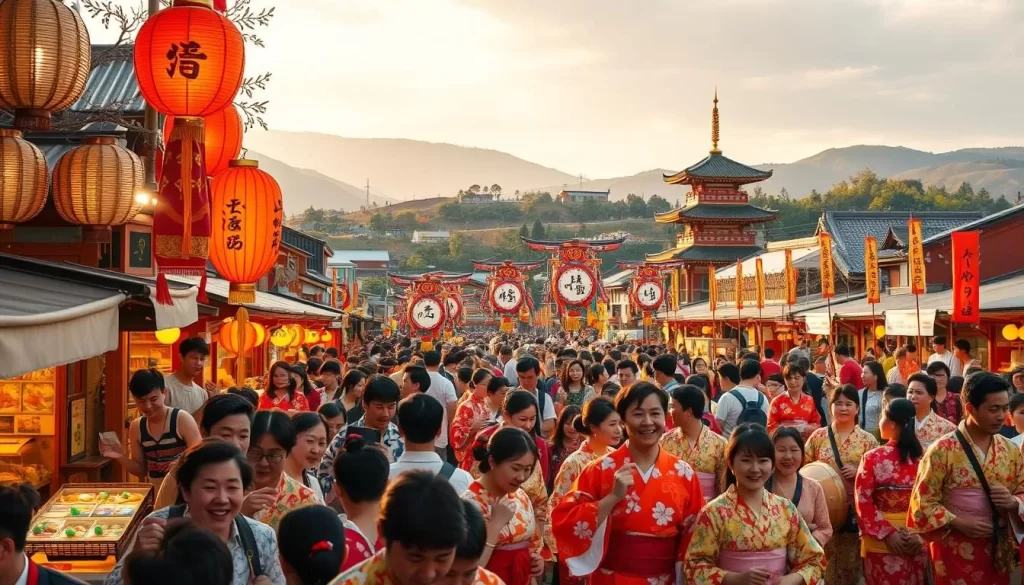
What to Wear and Bring to Ehime Festivals
As you plan your trip to Ehime, consider what to wear and bring to ensure a comfortable and enjoyable festival experience. The right attire and essentials can make a significant difference in your overall enjoyment.
Appropriate Attire for Different Seasons
Ehime’s festivals take place throughout the year, and the weather can vary significantly. For summer festivals, lightweight, breathable clothing is recommended due to the hot and humid conditions. In contrast, fall festivals in October may require layers as temperatures can fluctuate throughout the day. Many locals wear yukata, a casual summer kimono, which can enhance your experience and make for great photo opportunities.
Essential Items for Festival Comfort
Comfortable walking shoes are a must, as you’ll likely be on your feet for hours. Other essentials include a small towel for wiping sweat, a folding fan, a water bottle, and a small bag or backpack to keep your hands free. Consider bringing cash in small denominations, as not all vendors accept credit cards. For night events or fireworks displays, bring appropriate camera equipment and a portable charger.
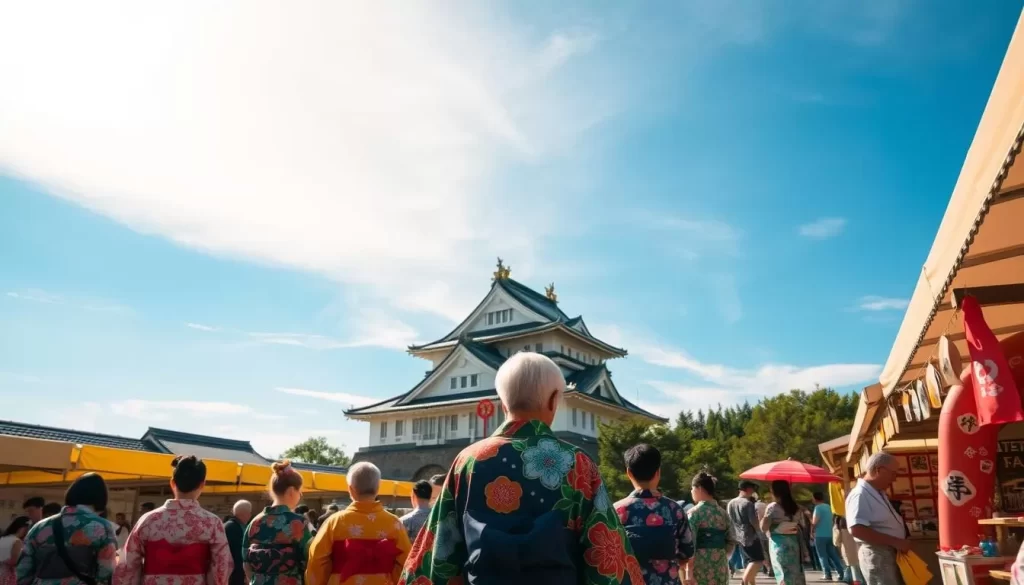
Local Foods to Try During Ehime Festival Season
As you immerse yourself in Ehime’s vibrant festival atmosphere, be sure to indulge in the local food that showcases the region’s rich cultural heritage. The festivals in Ehime offer a unique culinary experience, with a variety of dishes that reflect the prefecture’s seasonal ingredients and traditions.
Festival-Specific Delicacies
During the Niihama Taiko Festival, don’t miss trying fuguzaku, a local specialty that combines pufferfish, filefish liver, and green onions in a tangy ponzu sauce. Other festivals like the Dogo Onsen and Doyo Yoichi celebrations feature seasonal specialties such as hiyashi chuka (cold ramen) and kakigori (shaved ice desserts).
Ehime’s Famous Mikan and Other Regional Specialties
| Local Specialty | Description |
|---|---|
| Mikan | Ehime’s famous mandarin oranges, enjoyed fresh or used in various desserts and dishes |
| Fuguzaku | A Niihama specialty combining pufferfish, filefish liver, and green onions in ponzu sauce |
| Hiyashi Chuka | Cold ramen noodles served during summer festivals |
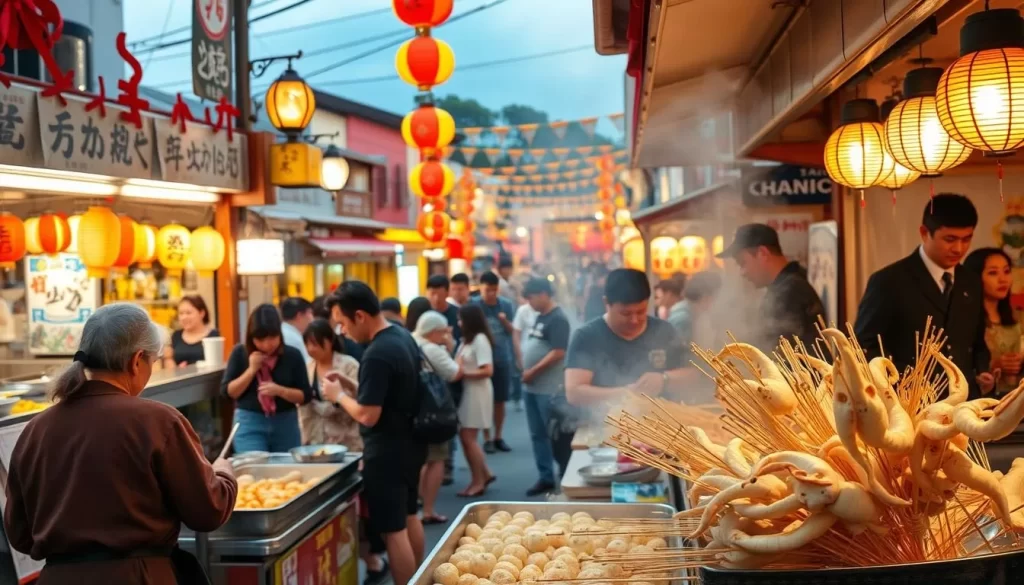
Where to Stay When Attending Ehime Festivals
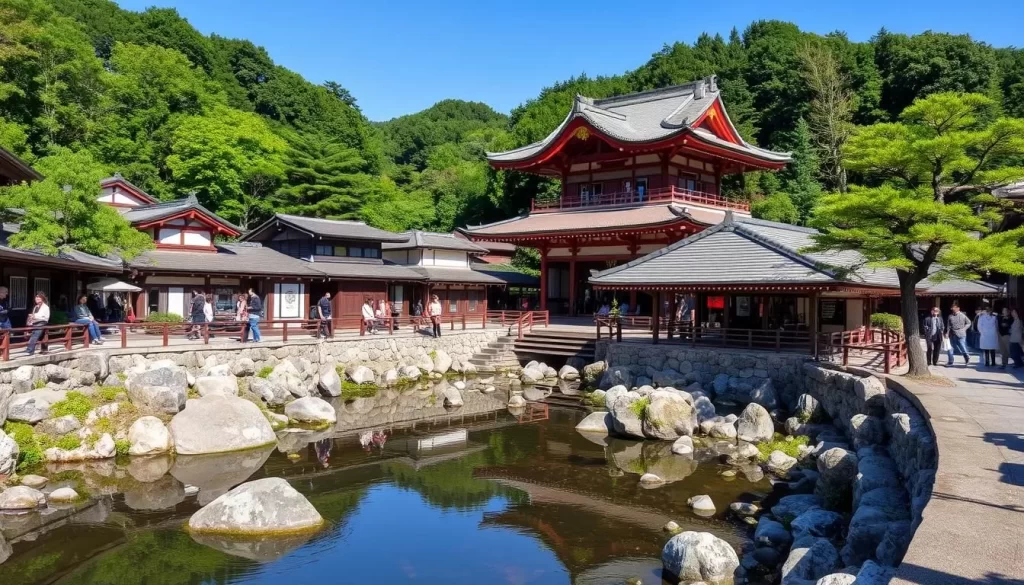
To truly experience Ehime’s festivals, you need to find a comfortable and conveniently located place to stay. Securing accommodations well in advance is crucial when planning to attend Ehime’s popular festivals, as hotels in festival cities often reach full capacity weeks or even months before major events.
Accommodations in Matsuyama
Matsuyama, as the prefecture’s capital and largest city, offers the widest range of accommodation options, from luxury hotels near Dogo Onsen to budget-friendly business hotels and traditional ryokans in the city center. You can enjoy the city’s amenities and easily access various festival locations.
Lodging Options in Niihama and Uwajima
For the Niihama Taiko Festival in October, consider staying at Hotel Niihama Hills Prince-kan or Hotel Route Inn Niihama, both of which provide comfortable accommodations within the festival area. When attending the Uwajima Ushi-Oni Festival in July, lodging options are more limited, making early reservations essential to secure a place within walking distance of the main festival activities.
Some festivals, particularly the Saijo Festival, see such an influx of visitors that nearby cities like Imabari (home to the Imabari Kokusai Hotel) can provide alternative accommodation options with transportation connections to the festival site. For a more authentic experience, consider staying at a minshuku (family-run guesthouse) in the festival area.
Transportation Tips for Festival Hopping in Ehime
To make the most of your festival-hopping experience in Ehime, it’s essential to know how to get around. Ehime Prefecture offers a variety of transportation options that cater to different needs and preferences, ensuring that you can enjoy the numerous festivals without worrying about how to get from one place to another.
Getting Around Matsuyama City
Matsuyama City is well-equipped with an efficient tram system that connects major festival venues. For instance, the Dogo Onsen area and downtown shopping arcades, where the Doyo Yoichi Summer Festival is held, are easily accessible by tram.
Traveling Between Festival Locations
For traveling between different festival locations across Ehime, the JR Yosan Line is the main railway artery. It connects Matsuyama with other significant cities like Niihama, where the Taiko Festival takes place, and Uwajima, known for the Ushi-Oni Festival.
Other transportation options include special shuttle buses that operate during major festivals, making it easier to reach festival grounds from train stations. Renting a car can also provide the flexibility needed for a festival-hopping trip, especially for more remote locations. Additionally, many hotels offer free bicycle rentals, which are perfect for navigating crowded festival streets.
| Transportation Method | Description | Best For |
|---|---|---|
| Matsuyama Tram | Efficient tram system within Matsuyama City | Local festival venues like Dogo Onsen |
| JR Yosan Line | Main railway line connecting major cities | Traveling between cities like Matsuyama, Niihama, and Uwajima |
| Special Shuttle Buses | Operate during major festivals | Direct access to festival grounds from train stations |
| Car Rental | Offers flexibility for traveling between festivals | Remote festival locations or multiple events in a short span |
| Bicycle Rentals | Convenient for short distances | Navigating crowded festival streets |
Photography Opportunities at Ehime Festivals
From elaborate floats to dramatic performances, Ehime’s festivals provide endless opportunities for photographers to capture Japan’s living traditions. Each celebration offers unique visual elements that showcase the region’s rich cultural heritage.
Best Vantage Points for Festival Photos
To capture the best images, position yourself strategically. For the Niihama Taiko Festival, secure a spot along the main parade route early to get unobstructed views of the massive gold-decorated floats. The Matsuyama Fall Festival’s mikoshi battles, occurring in early morning light, create dramatic shadows and highlights perfect for action shots.
Tips for Capturing Night Festivals and Fireworks
The Uwajima Ushi-Oni Festival presents special photography challenges with its night parades and fireworks display. Use higher ISO settings and consider a tripod to capture the dramatic display in low light. Scout locations in advance to find clear views of the night sky with interesting foreground elements.
| Festival | Best Time for Photos | Tips |
|---|---|---|
| Niihama Taiko Festival | During the strength competitions | Position yourself along the main parade route |
| Matsuyama Fall Festival | Early morning | Capture the mikoshi battles in the morning light |
| Uwajima Ushi-Oni Festival | Nighttime | Use higher ISO settings and a tripod for the fireworks display |
Combining Festival Visits with Other Ehime Attractions
Beyond the excitement of Ehime’s festivals, the prefecture is home to numerous historical sites, natural wonders, and cultural landmarks waiting to be explored. As you plan your trip around these events, consider extending your stay to discover the rich culture and history that Ehime has to offer.
Dogo Onsen and Historic Sites
After experiencing the Dogo Onsen Summer Festival, you can enjoy the historic bath house itself, which dates back over 3,000 years and inspired the bathhouse in Studio Ghibli’s “Spirited Away.” Matsuyama Castle is another must-visit, offering spectacular views of the city and is within walking distance of many festival locations.
Natural Wonders and Scenic Routes
The culture of Ehime is complemented by its natural beauty. The Shimanami Kaido cycling route connects Ehime to Hiroshima Prefecture across spectacular island-hopping bridges, providing an active adventure to complement your festival experiences. Additionally, Ehime’s natural wonders, including the Nametoko Gorge with its waterfalls and hiking trails, offer peaceful retreats after the excitement and crowds of festival celebrations.
Conclusion: Making the Most of Your Ehime Festival Experience
Experiencing Ehime’s festivals is a journey into the heart of Japanese traditions, where communities come together to celebrate their heritage. Ehime’s festivals offer a unique window into authentic Japanese traditions that have been preserved for generations. By immersing yourself in these celebrations, you’ll witness firsthand how festivals serve as a way for communities to strengthen bonds and pass down cultural knowledge.
To make the most of your Ehime festival experience, plan your visit with both scheduled events and spontaneous exploration in mind. The spirit of these festivals reflects the character of Ehime’s people—resilient, proud of their heritage, and welcoming to visitors. Whether you participate or observe, interacting with local people during festivals creates opportunities for meaningful connections.
Whatever time of year you plan your visit, you’ll find a festival that showcases Ehime’s unique cultural identity, providing an unforgettable way to experience traditional Japan.
The above is subject to change.
Check back often to TRAVEL.COM for the latest travel tips and deals.
